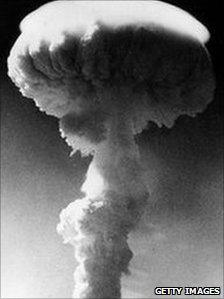Nuclear test veterans win Supreme Court appeal bid
- Published

Nuclear testing was carried out on Christmas Island in the South Pacific
Veterans involved in Britain's nuclear weapons tests between 1952 and 1958 have been granted leave to appeal in their fight for compensation.
The Supreme Court agreed to their application for permission to appeal, and is expected to hear their cases later this year.
More than 1,000 ex-servicemen say exposure to radiation has led to ill health, such as cancer.
The Ministry of Defence maintains no "causal" link can be proved.
Lawyers for the 1,011 veterans asked the Supreme Court for permission, external to be allowed to argue their right to seek damages.
If the Supreme Court rules that their claims can go ahead, a hearing for damages would take place in the High Court.
The Court of Appeal had ruled that nine out of 10 "lead" cases had been brought too late to be heard.
The latest ruling means the veterans can take their cases back to court but does not make it more likely they will win.
'Difficult cases'
Giving the decision, Lord Phillips, President of the Supreme Court, said: "Might I just emphasise this is only an application for permission to appeal.
Veterans' widows Shirley Denton and Wendy Brothers say they were "thrilled" by the decision
"The court would not wish to raise false optimism in what are obviously some very difficult cases."
Outside court, veterans' solicitor Neil Sampson said: "This is a significant step forward in the veterans' fight for justice, but it's by no means the end of the road.
"We welcome the Supreme Court's decision and hope that we can have a hearing at a very early date.
"Unfortunately it may well be another year before the Supreme Court is able to have a full hearing of this matter."
The decision was reached by Lord Phillips, Lady Hale and Lord Brown.
Veteran's widow Shirley Denton told the BBC: "I am hoping, that with compassion and understanding, perhaps the courts can move more quickly and put the age of the veterans and the widows in preference to the delay that we've faced for so long.
Veterans' solicitor Neil Sampson: "This is a significant step forward"
"But I am absolutely thrilled. It's wonderful."
A lawyer for some of the veterans, James Dingemans QC, told the Supreme Court judges that the ruling by the Appeal Court preventing the case from going ahead had been "unfair".
"To have driven these people [out] without a hearing, without even cross-examination... is, we submit, wrong," he said.
Lawyers for the MoD maintained the cases had been brought too late and said the veterans would not be able to "show any causation" if they did proceed.
'No protection'
Veterans have been battling since 2004 for recompense and a recognition of their claim that their poor health was caused by radiation exposure.
Chronic health problems cited by them include cancers, skin defects, fertility problems and birth defects in their children.
The UK carried out a series of nuclear weapons tests in mainland Australia, the Montebello islands off the west Australian coast and on Christmas Island, in the Pacific, in the 1950s.
Those tests were conducted against a backdrop of decolonisation and the growing Cold War threat, with the UK desperate to establish and show itself as a nuclear power.
Ken McGinley, a veteran from Johnstone, Renfrewshire, told the BBC: "On Christmas Island I witnessed five bomb tests. Basically we had no protection and warnings at all.
"All we were told to do was to stand and look at the bomb [and] cover our eyes up in case we got blinded by the flash."
In June 2009, the High Court gave the current group of veterans the right to sue the Ministry of Defence.
Veterans who served in the Army, the Royal Navy and the Royal Air Force - as well as personnel from New Zealand and Fiji - were all exposed to radiation.
In 1998, research from Durham University suggested that one in three servicemen exposed to the tests died from bone cancers or leukaemia linked to the atomic and hydrogen bomb tests.
Last year the appeal judges said nine test cases had been launched outside the legal time limit and so stopped them from proceeding.
The one case that was allowed to go ahead related to a man, Bert Sinfield, who had already died.
- Published29 July 2011
- Published22 November 2010